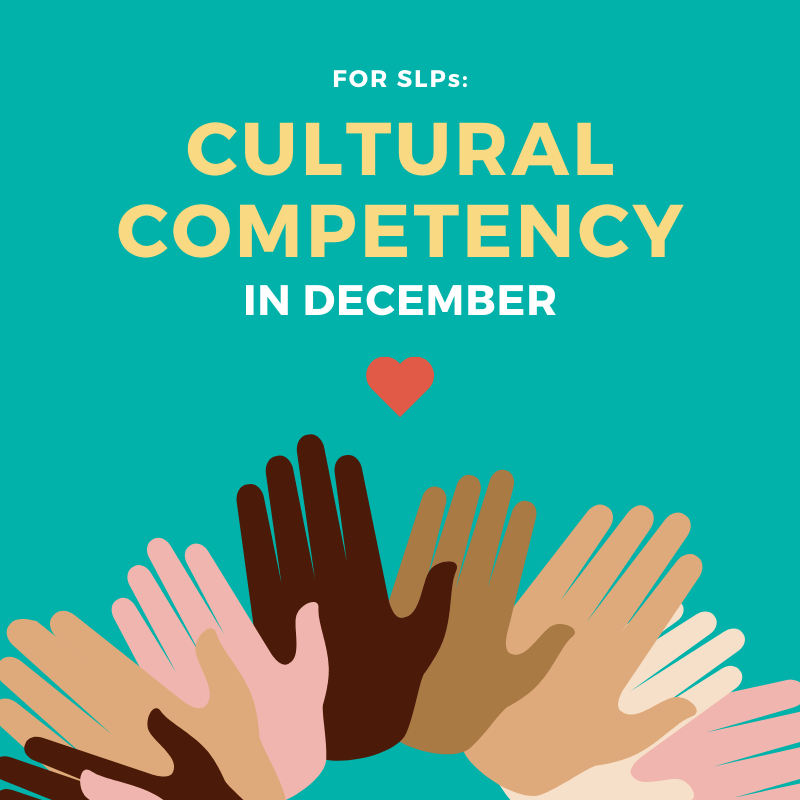One of the best things about providing speech/language services in a school setting is endless access to real-life communication demands. We are always pulling natural context into our therapy sessions, and building opportunities to use speech/language skills outside the therapy room. So in November and December, it is only natural to think about incorporating holidays and seasonal festivities into our therapy sessions. Culturally competent SLPs, however, know that holiday themes in therapy can be a bit of a minefield.

SLPs often find themselves in settings where they may not know a lot about the community, the cultures represented, or other efforts going on in the building. A telepractice setting can make this kind of knowledge even harder to pin down. Even if your caseload and work setting are familiar and closely reflect your own background and culture, holiday themes can inadvertently exclude, offend, or “otherize” students who are not of the same culture. So . . .
What is a culturally competent SLP to do during December?
My December practice closely reflects what I do during the rest of the year. Year-round I make efforts to integrate a variety of cultural traditions into my materials and sessions. I try to use books and visuals that reflect the racial and ethnic diversity of the school I’m in as well as those of cultures that are unfamiliar to my students. I focus on themes that are common to all of us — friendship, conflict, family, and emotions — and shy away from most holidays. With those fundamentals in mind, I approach December in the same way:
Teach “Holiday” as a Concept
Use the concept of “holiday” to talk about celebration and all the ways and reasons we celebrate. Comparing and contrasting celebrations involves a host of language-rich tasks and can also be used to introduce different perspectives. What is a holiday? How is it different from a birthday? What kinds of vocabulary go along with holidays as a concept? At the elementary level, students can discuss why we celebrate, how we celebrate, and how people in other countries celebrate. Higher level students could consider historical perspectives on holidays, differing perspectives of children and adults, or how to be respectful of traditions other than their own.
Model Openness and Respect
Be explicit with your students about all holidays being equally important, and be aware of the non-verbal messages you’re sending as well. Are the materials you’re using in December truly culturally-neutral or do they subtly show a preference for Christmas? How about the decorations you have up in your office? If you decide to learn about a seasonal holiday, do your homework beforehand, making an effort to learn from sources that are of the culture you’re learning about. Don’t expect a single student to be able to explain a whole culture, the history of a holiday, or tradition to you. Be ready to answer questions about what you are doing and why. Use this opportunity to share the importance of language and culture with teachers and family.
Encourage Your Students to Listen and Ask Questions
You’ve likely already established norms in your therapy room and school building that address learning and respect. Extend this to your holiday practices. Allow your students to talk openly about traditions in their families, and tell stories about how they celebrate. This is important all year long, as not all cultures have a significant holiday in December. This “Analyzing the School Calendar” lesson from Teaching Tolerance has accompanying handouts, vocabulary, and state standards and is a great conversational jumping-off point for grades 6-12. I also highly recommend this December Dilemma packet, also from Teaching Tolerance, that includes exercises for yourself and lesson plans on respect, identity, and beliefs for grades k-12.
“A language is not just words. It’s a culture, a tradition, a unification of a community, a whole history that creates what a community is.” – Noam Chomsky
The diversity in our schools is a wonderful thing and we are lucky to have the opportunity to have meaningful conversations with students. With a little bit of forethought, you can easily create an inclusive and engaging space for all students every day of the year.





